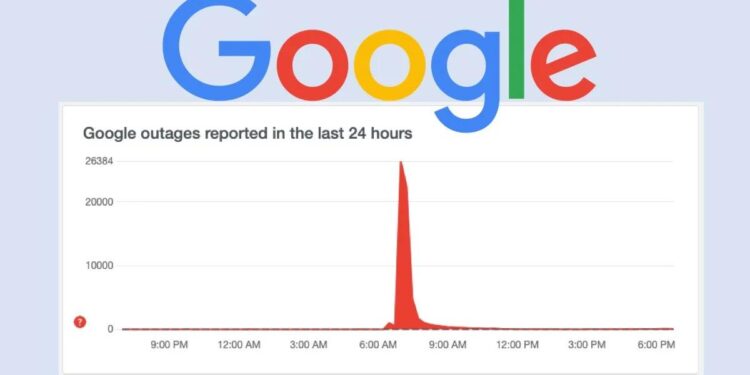A widespread Google outage has disrupted numerous services across TĂĽrkiye and Southeast Europe, according to reports from the Digital Watch Observatory. The incident, which began earlier today, has affected access to key Google platforms including search, email, and cloud services, causing significant interruptions for both individual users and businesses in the region. Authorities and industry experts are monitoring the situation closely as tech teams work to identify the root cause and restore full functionality. This outage highlights the growing dependence on major digital infrastructure and raises concerns about the resilience of online services amid increasing demand.
Impact of Google Outage on Critical Digital Infrastructure in TĂĽrkiye and Southeast Europe
The recent Google outage has sent ripples across the digital landscape of TĂĽrkiye and Southeast Europe, revealing the fragility of critical infrastructure heavily dependent on cloud-based services. Major sectors, including banking, telecommunications, and government portals, faced intermittent disruptions, leading to significant service delays and operational bottlenecks. Businesses reliant on Google Workspace and Cloud services struggled with both internal communications and external client interactions, highlighting an over-reliance on a single digital ecosystem.
Key impacts observed during the outage:
- Banking and Financial Services: Delays in transaction processing and real-time data access impaired customer service and compliance operations.
- Government Services: Temporary unavailability of e-governance platforms hindered public access to essential services.
- Telecommunications: Disruptions in communication apps led to increased call center loads and frustrated users.
- SMEs and Startups: Workflow interruptions affected productivity and project timelines.
| Sector | Impact | Duration (hrs) |
|---|---|---|
| Financial | Transaction Delays | 3.5 |
| Government | Service Downtime | 4 |
| Telecom | Communication Interruptions | 2.5 |
| SMEs | Project Delays | 3 |
Analysis of Service Disruptions and Economic Consequences for Regional Businesses
The widespread Google outage wreaked havoc on digital operations for numerous regional enterprises, notably in TĂĽrkiye and Southeast Europe. Businesses reliant on Google’s cloud infrastructure, Gmail services, and advertising platforms encountered significant interruptions, leading to a cessation in communications, delayed transactions, and stalled marketing campaigns. E-commerce platforms reported a 30% drop in revenue during peak hours of the outage, while SMEs faced amplified difficulties due to limited alternative resources. The disruption also highlighted the vulnerability of interconnected digital ecosystems, where one service failure triggers a domino effect on dependent applications and work processes.
An initial assessment of the economic impact reveals several notable consequences:
- Customer dissatisfaction: Unable to access services, many clients turned to competitors’ platforms, affecting brand loyalty.
- Operational delays: Delayed email communications and cloud storage interruptions hindered project timelines.
- Advertising loss: Suspended Google Ads campaigns resulted in wasted budgets and missed opportunities.
The table below summarizes the estimated financial impact on key sectors during the disruption period:
| Sector | Estimated Loss (%) | Primary Impact |
|---|---|---|
| E-commerce | 30% | Transaction failures, checkout errors |
| Logistics | 18% | Delay in shipping updates |
| Logistics | 18% | Delay in shipping updates |
| Small and Medium Enterprises (SMEs) | 25% | Resource limitations amplified impact |
| Advertising & Marketing | 22% | Suspended campaigns, budget wastage |
Overall, the outage underscored the critical need for diversified digital strategies and resilient infrastructure planning, especially for businesses operating in regions heavily dependent on cloud-based services. Future mitigation approaches might include multi-cloud adoption, enhanced offline capabilities, and contingency communication plans to reduce operational risks during similar incidents.
Let me know if you want me to help style it further or summarize the analysis!
Recommendations for Strengthening Internet Resilience and Contingency Planning in Affected Areas
Building a more robust digital infrastructure is crucial to mitigating the impact of widespread outages like the recent Google disruption. Local internet service providers and governments should collaborate to develop redundant network pathways that can automatically reroute traffic when one major node fails. Investing in decentralized DNS services and promoting multi-homing strategies for critical communication systems will reduce dependency on singular points of failure. Additionally, encouraging businesses and public institutions to adopt comprehensive disaster recovery plans with regular simulation drills can ensure rapid response and minimal downtime during connectivity crises.
Community awareness and education also play an indispensable role. Stakeholders need to prioritize transparent communication channels that inform users of ongoing issues and contingencies in real-time. The table below outlines vital steps recommended for regional authorities to enhance resilience and improve contingency readiness:
| Key Area | Recommended Action | Impact |
|---|---|---|
| Network Diversification | Establish multiple ISPs and backbone providers | Reduces risk of single points of failure |
| Emergency Protocols | Implement cross-sector coordination drills | Improves crisis response efficiency |
| Public Awareness | Deploy real-time status dashboards and alerts | Enhances transparency and user trust |
| Infrastructure Investment | Accelerate funding for fiber optic and 5G expansion | Boosts overall network capacity and speed |
To Conclude
The widespread Google outage impacting services across TĂĽrkiye and Southeast Europe underscores the growing dependence on digital infrastructure in the region. As users and businesses await a full resolution, this incident highlights the critical need for robust contingency plans and diversified online ecosystems to mitigate the effects of such disruptions in the future. Digital Watch Observatory will continue to monitor developments and provide updates on the restoration process and its broader implications for digital resilience.
















